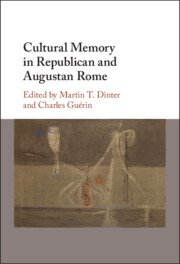Book contents
- Cultural Memory in Republican and Augustan Rome
- Cultural Memory in Republican and Augustan Rome
- Copyright page
- Contents
- Figures
- Contributors
- Acknowledgements
- Chapter 1 Introduction: What is Cultural Memory?
- Part I Writing Cultural Memory
- Part II Politicising Cultural Memory
- Chapter 10 Sulla’s Dictatorship Rei Publicae Constituendae and Roman Republican Cultural Memory
- Chapter 11 Remembering Differently: The Exemplarity ofPopulares as a Site of Ideological Contest in Late Republican Oratory
- Chapter 12 Cultural Memory and Political Change in the Public Speech of the Late Roman Republic
- Chapter 13 Remembering M. Brutus: From Mixed and Hostile Perspectives
- Chapter 14 The Making of an Exemplum: Cato’s Road to Uticensis in Roman Cultural Memory
- Part III Building Cultural Memory
- Part IV Locating Cultural Memory
- Bibliography
- Index Locorum
- Index
Chapter 10 - Sulla’s Dictatorship Rei Publicae Constituendae and Roman Republican Cultural Memory
from Part II - Politicising Cultural Memory
Published online by Cambridge University Press: 27 April 2023
- Cultural Memory in Republican and Augustan Rome
- Cultural Memory in Republican and Augustan Rome
- Copyright page
- Contents
- Figures
- Contributors
- Acknowledgements
- Chapter 1 Introduction: What is Cultural Memory?
- Part I Writing Cultural Memory
- Part II Politicising Cultural Memory
- Chapter 10 Sulla’s Dictatorship Rei Publicae Constituendae and Roman Republican Cultural Memory
- Chapter 11 Remembering Differently: The Exemplarity ofPopulares as a Site of Ideological Contest in Late Republican Oratory
- Chapter 12 Cultural Memory and Political Change in the Public Speech of the Late Roman Republic
- Chapter 13 Remembering M. Brutus: From Mixed and Hostile Perspectives
- Chapter 14 The Making of an Exemplum: Cato’s Road to Uticensis in Roman Cultural Memory
- Part III Building Cultural Memory
- Part IV Locating Cultural Memory
- Bibliography
- Index Locorum
- Index
Summary
At the beginning of the second book of Cicero’s De re publica (54–51 BC) we find a remarkable passage: Scipio Aemilianus, one of the dialogue’s interlocutors, cites Cato the Elder’s statement on the superiority of the res publica. Cato attributes the success of the Roman Republic to its gradual evolution thanks to the combined wisdom of many Romans through many generations. Cato rates the Roman constitution much more highly than the ones of Crete, Sparta and Athens because the laws and institutions of these Greek polities have been crafted by only a few, albeit ingenious, persons.
- Type
- Chapter
- Information
- Cultural Memory in Republican and Augustan Rome , pp. 169 - 182Publisher: Cambridge University PressPrint publication year: 2023
- 1
- Cited by

